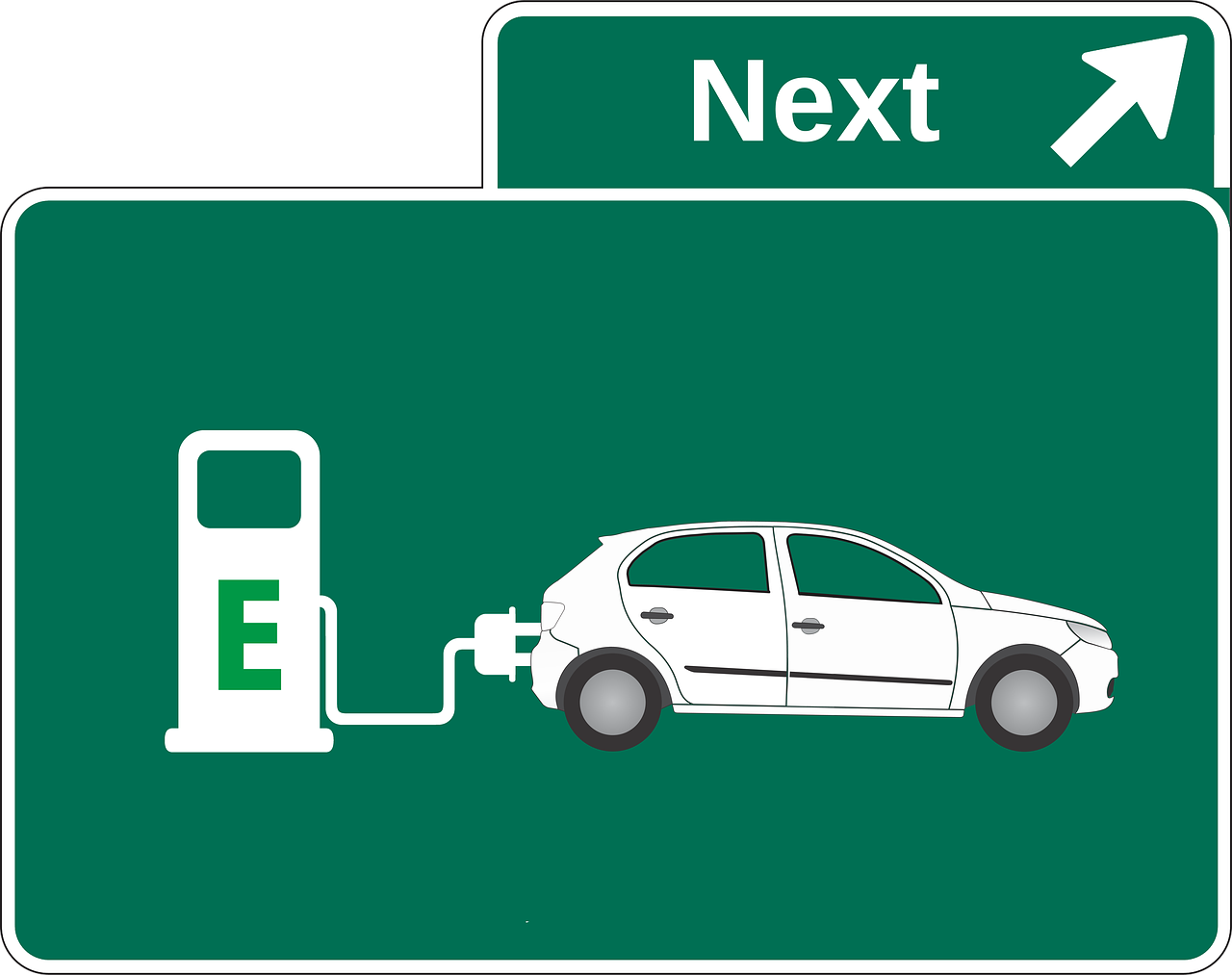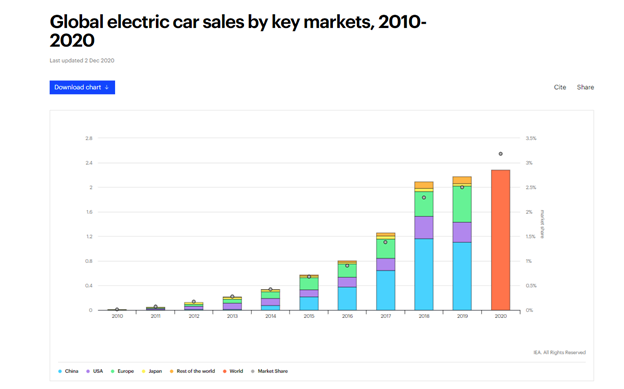Electric Vehicles: on the edge of the new frontier
Electric Vehicles have been evolving constantly over the last 10 years, however what most people do not know is that the journey of the alternative means of transportation has an exceptionally long history.

Electric Vehicles have been evolving constantly over the last 10 years, however what most people do not know is that the journey of the alternative means of transportation has an exceptionally long history.
Background
The history of the electric car goes back to the 19th century. One of the first ones was developed in 1832 by Robert Anderson. The first practical version was developed in 1870s. As electricity became easily accessible and more prominent numerous inventors tried to improve and/or create new version of the vehicle. Ferdinand Porsche famously developed the P1 model. However, the famous Model T car that was developed by Ford Motors and the wide adoption of gasoline put a dent in the electric car’s early start.
It was not until the 1970s with the OPEC oil embargo that electric cars were brought back into the limelight. Congress passed the 1976 Electric and Hybrid Vehicle Research, Development, and Demonstration Act, which paved the way forward for the development of such vehicles once more. Still electric vehicles lagged gasoline cars in performance, speed and distance covered. It was not till the 1990s that interest peaked once again. GM even developed a model called the EV1, however the car itself had high production costs, which meant that it was not financially viable. All was not lost and in 1997 Toyota introduced the Prius model, which became the first mass-produced hybrid vehicle. The next innovation came with Tesla, which was a small startup in 2006, and yet had a great ambition. Thanks to a Department of Energy loan worth $465 million it was able to establish a manufacturing facility in California and launch an electric vehicle capable of traveling 200 miles on a single charge.
Current Situation
As one can see the history of the electric vehicle has been dynamic, challenging, and fraught with difficulties. Now in 2021 the situation is a lot different. Electric vehicles have become trendy, due to their increased range, comparable costs to normal cars, increased capacity, and automatic gear changes.
The electric vehicles market has changed dramatically over the last 10 years from a niche market with thousands of cars being sold to millions being sold in 2020(2.3million), however even with this dramatic increase global sales of electric vehicles represent just 2.6% of the global total numbers.
Global electric car sales by key markets, 2010-2020:

The major markets for electric vehicles are the USA, Europe and China, with the Chinese market accounting for 53% of all demand.
Why is the adoption only in certain countries? The issue is multifold and requires a deeper understanding that having a mode of transport is part of wider framework that entails many different aspects. There are many challenges that lie ahead before electric vehicles can become more widely adopted.
What challenges lay ahead?
There is increased interest and demand in developed regions of the world, however in developing countries that interest has not increased. There are many reasons for this such as:
- Limited infrastructure that can support a large electric vehicle fleet.
- Higher purchasing price, when compared to traditional gasoline cars.
- Speed of recharging such a vehicle.
- Not enough incentives for consumers to make the switch.
- Limited range for lower class models.
These factors are currently limiting the wide-spread adoption of electric vehicles. That is not to say there are no new developments in it. All the major car manufactures have been keeping an eye on the market and have introduced their own electric vehicles over the years. Granted Tesla was the first company to try to push this as an initiative, however all the large US motor companies along with their European and Asian counterparts have been keeping notes and have launched many new models over the last 2-3 years.
The major issue is still energy generation and scale of electric infrastructure. It is projected by the European Environmental Agency that by 2050 such vehicles would put a significant strain on power systems in Europe.
Current charging stations are way to slow and cumbersome to make electric vehicles a viable mass transport alternative. Most models require a 7-8 hours charge time, which makes it inefficient for long journeys, where instead one can choose a petrol car than can easily be filled in minutes. Rapid charge point would be a viable alternative as they would enable an electric vehicle to be charged in 20-30min.
Another issue with charging points is the limited scale of these. In the USA, there are 111,000 petrol stations and 95,000 charging points between the US and Canada. However, only a fraction of these stations supports fast charging-just 4,700.
Another interesting factor is that there has been an increased interest from large urban centers towards larger vehicles such as buses to combat pollution and congestion. Close to half a million of electric buses in operation are in China.
Adoption, however, should pick in the next 10 years as the IEA predicts under two scenarios- a sustainable one and a stated policy one. (see figure 2 and 3). The stated policy scenario incorporates existing government policies, whilst the sustainable one incorporates the Paris agreement, which calls for 30% market share of electric vehicles. Please do read the IEA report as it has a lot of interesting and insightful information. Also, in terms of how long electric vehicles can last, the current estimate is around 100,000 miles or 160,934.4km, which is due to longevity of the batteries they use. Still, newer versions of the batteries could make the life cycle longer and enhance the offering of future models.


All in all, electric vehicles have had a long and difficult journey, which is not over just yet. It is the start of a new trend that could potentially revolutionize the new century and bring a more advance mode of transport for all of humanity with the aim of reducing our dependence on carbon-based fuels and also for cleaner air.
https://www.iea.org/data-and-statistics/charts/global-electric-car-sales-by-key-markets-2015-2020
https://www.iea.org/reports/global-ev-outlook-2020
https://www.iea.org/reports/global-ev-outlook-2020
Sources Used(not an exhaustive list):
Electric Cars The History of the Electric Car | Department of EnergyA Brief History of the Electric Car, 1830 to PresentThe Surprisingly Interesting History of Electric CarsHistory of the electric car | What Car?Global electric car sales by key markets, 2010-2020 – Charts – Data & Statistics – IEAElectric Cars | Auto Trader UKTesla, MG and Porsche lead doubling of electric car sales in first quarterElectric vehicles registered in the UK – Office for National StatisticsElectric mobility worldwide – statistics & facts | Statista6 Interesting Statistics about Electric VehiclesElectric Vehicle Market Growth, Industry Trends, and Statistics by 2030Volkswagen ID 3 was Europe’s best-selling electric car in October | AutocarGlobal sales of electric cars accelerate fast in 2020 despite pandemic | Electric, hybrid and low-emission cars | The GuardianNissan LEAF the best-selling EV in the world, followed by… | Car News | Auto123Electric vehicle market statistics 2021 – How many electric cars in UK ?Global EV Outlook 2020 – Analysis – IEAMcKinsey Electric Vehicle Index: Electric Vehicle Trends | McKinseyDo Electric Cars Have Gears? No. Here’s Why – The Green OptimisticToyota: Hydrogen cars to go mainstream in Australia by 2024Electric vehicles and the energy sector.pdf6 myths about electric vehicles busted | National Grid GroupCan the grid cope with the extra demand from electric cars? | National Grid GroupElectric Vehicle Infrastructure | London City HallCharging ahead! The need to upscale UK electric vehicle charging infrastructure – PwC UKIs the infrastructure ready for an electric vehicle future? | Automotive World